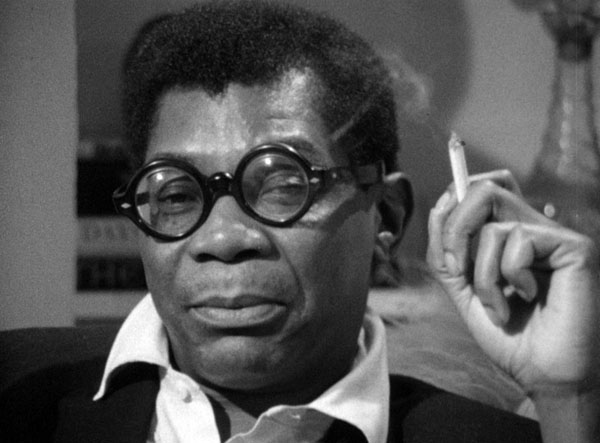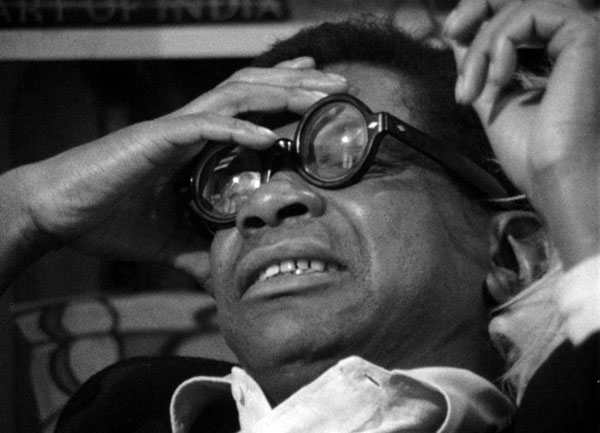“Restored and back in distribution thanks to the tireless folks at Milestone Films, the 1967 documentary Portrait of Jason is, without a doubt, Shirley Clarke‘s most radical, as well as her most personal, film,” begins J. Hoberman at Artinfo. “Clarke adapted her first feature, The Connection (1961), from a stage play and her second, The Cool World (1962), from a novel. The text for Portrait of Jason was to be a person—the 42-year-old hustler, hanger-on, and would-be cabaret performer who called himself Jason Holliday. That Jason (nee Aaron Payne) was black, gay, and apparently shameless made him an all the more intriguing objet trouvé; that Clarke was following a trail recently blazed by Andy Warhol made her notion of a movie in which a ‘found’ personality would riff for the camera in real time all the more au current.”
“Jason was loved and loathed, a reception that mirrored its internal ups and downs,” writes Manohla Dargis in the New York Times. “It played at the New York Film Festival, and John Cassavetes singled it out for praise, as did Ingmar Bergman (‘the most fascinating film I’ve ever seen’). Pauline Kael wasn’t a fan. ‘The idea,’ she wrote, ‘is that, faced with the camera, his defenses will be stripped away and the “inner” man revealed—an idea both sadistic and naïve.’ … Portrait of Jason is about a lot of things, sex included, along with the blur between fact and fiction. As a manifestation of Clarke’s lifelong interest in African-Americans it can also feel like part of her own self-portrait…. ‘Would you believe it if I told you that I never felt that I was interesting enough?’ Clarke asked an interviewer in 1975. ‘So I used the “junkie” or “the black man” to express my feelings of alienation.'”
“Holliday’s incessant, infectious laughter imbues and lightens stories of terrible racism and childhood abuse, turning nearly every anecdote into a Cabaret act rather than a painful confession,” writes Anthony Kaufman at Sundance Now. “And repeatedly throughout the film, like a comedian with a trademark phrase, he waves his arm with a swish and snaps his fingers, saying, ‘I’ll never tell.’ But Holliday does tell. Whether or not he’s performing a nightclub routine that he never managed to realize as a career, the man’s monologues suggest a life of deep suffering…. Clarke exploits that pain, which can be difficult to watch…. Is he the entertaining ‘house-boy,’ as he calls himself, doing the bidding of his ‘masta’? Or is Holliday using Clarke to achieve the 15-minutes (or 104 minutes, to be exact) of fame that he always sought?”
“You could spend a lifetime peeling the glass onion of Shirley Clarke’s merciless documentary,” writes David Fear in Time Out New York. “As slippery in its own identity as its subject, this totally quotable, long-neglected vérité nugget serves as a sideways time capsule, creating a blurry snapshot of an Afro-camp subculture during the era of Christopher Street bar raids and burn-baby-burn rioting. The fact that the director and her companion, Carl Lee, taunt the increasingly inebriated Holliday to tears by the end only adds another layer of frisson to Holliday’s long, dark night of the soul.”
Noting that Clarke occasionally “scoffs from the sidelines,” Ernest Hardy, writing in the Voice, argues that “Lee’s interactions with Jason are even more revealing, fraught with an unexplained backstory that is filled with homoerotic tension from Jason’s end, but disdain and dismissiveness from Lee’s. At one point, Jason is dismantling the insecurities that have tormented him, saying, ‘They told me I was cute. I thought I was the ugliest thing in town.’ Lee commands, ‘Talk about the nickel-and-dime shit, not about being cute.’ It’s the Negro trickster he wants, the entertainment that is spun from black pain, not serious consideration of that pain. And that, of course, is the demand at the heart of the consumption of that most imitated and misunderstood of American cultural commodities: black cool.”
“By tagging this desultory, flamboyant monologue as a portrait, Clarke also aligns it with a tradition as much as she specifies her approach to the material,” suggests Joseph Jon Lanthier in Slant. “Both tonally and formally, symmetry is for instance achieved with Carl Van Vechten‘s portraits, which were similarly produced by a white creative that was obsessed with metropolitan African Americans. Hypersensitive to how mouths, overripe muscles, and shadows cast by brows and noses might throw off (or idealize) an image’s composition, Van Vechten cleverly negotiated the arrogance of his subjects (especially that of James Baldwin, Joe Lewis, and Truman Capote) with the arrogance of the camera. Jason’s effete manner, feisty garrulousness, and immense body not insignificantly suggest something of an amalgam of Baldwin, Lewis, and Capote—and Clarke counters this queen-bitch attitude by reminding us with vocal and technological interjections that this is a performance, and that aesthetic judgments have been made while recording it.”
Indiewire‘s Eric Kohn presents “10 choice quotes from Holliday’s feature-length moment in the spotlight.” Sara Fishko has more at WNYC. Portrait of Jason begins a week-long run at New York’s IFC Center today, and a DVD release is forthcoming.
Updates, 4/21: The New Yorker‘s Richard Brody: “Clarke invests herself in Holliday’s tales as a meticulous yet passionate insider; it’s as if she and he were involved in a mutual possession, Clarke unfolding her own psychic marginality and spontaneous artistry in his own dangerous self-dispersal and recovering her own artistic identity in his self-discovery—even as Holliday delivers himself, vulnerably and trustingly, to Clarke as the ‘material’ he knows his life to be. Midway through the film, he delivers a sort of epilogue on the wing: ‘I’m doing what I want to do and it’s a nice feeling that someone’s taking a picture of it… I will have one beautiful something that is my own.’ He could as easily be speaking for Clarke as to her.”
“In one heartbreaking moment, he literally begs his interviewers to ‘teach him’ how to be honest and stop acting,” notes David Fitzgerald at Cinespect, “but he’s become trapped inside his own armor of fast talk and high times. He literally couldn’t be himself if he wanted to, lending haunting credence to something Lee tells him earlier in the film: ‘There’s only one role you can do Jason, and that’s you.'”
The Film Society of Lincoln Center’s Eugene Hernandez talks with Amy Heller and Dennis Doros, founders of Milestone Films: “Heller paused when asked what drives her passion for film restoration. She said that she relishes challenging the notions of which films are considered significant. ‘I love the idea of fucking with the canon,’ she said simply, laughing.” Doros “characterized his interest in this project as an obsession… It was his favorite of all [of Clarke’s] work, yet only a print labeled dismissively as outtakes from the shoot remained. Hidden in those outtakes was a silver lining that Doros, Heller and preservationists wouldn’t discover for years.”
For news and tips throughout the day every day, follow @KeyframeDaily on Twitter and/or the RSS feed. Get Keyframe Daily in your inbox by signing in at fandor.com/daily.





